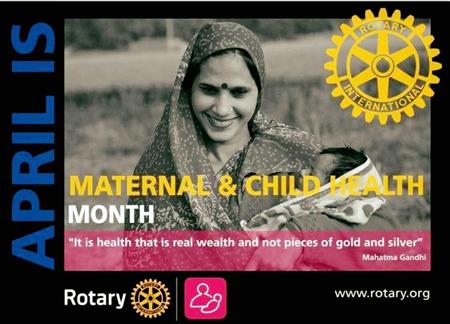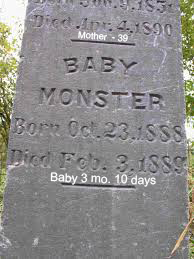 April is Rotary’s Maternal and Child Health month. As you probably know, in developed countries, women outlive men by an average of 5 to 10 years. This is a relatively new phenomenon. Until the dawn of the 20th century, men generally outlived women by many years. The main reason for this was that large numbers of women died from the complications of pregnancy and childbirth.
April is Rotary’s Maternal and Child Health month. As you probably know, in developed countries, women outlive men by an average of 5 to 10 years. This is a relatively new phenomenon. Until the dawn of the 20th century, men generally outlived women by many years. The main reason for this was that large numbers of women died from the complications of pregnancy and childbirth.
There were m any causes of this. In the first place, with no effective contraception and the social norms of the day, most women continued to bear children from the time they got married until they went through menopause. Families with 10 to 14 children were common. Add to this lack of food security, lack of clean water, different understandings of personal hygiene and no understanding of what we consider today to be basic medical care during pregnancy, and you can see why complications were common. Add to this that Doctors did not have any antibiotics or medications used to treat complications of pregnancy, and surgical techniques and anesthetics were primitive and had complications of their own, so even if complications of pregnancy were recognized, often little could be done.
any causes of this. In the first place, with no effective contraception and the social norms of the day, most women continued to bear children from the time they got married until they went through menopause. Families with 10 to 14 children were common. Add to this lack of food security, lack of clean water, different understandings of personal hygiene and no understanding of what we consider today to be basic medical care during pregnancy, and you can see why complications were common. Add to this that Doctors did not have any antibiotics or medications used to treat complications of pregnancy, and surgical techniques and anesthetics were primitive and had complications of their own, so even if complications of pregnancy were recognized, often little could be done.
The high birth rate was accompanied by a high infant and child mortality rate. Wome n who gave birth to a dozen children often only got to see 4 or 5 of them survive to adulthood. The causes of infant and child mortality were again, lack of safe water and sanitation, lack of food security food and lack of vaccinations and even basic medical care.
n who gave birth to a dozen children often only got to see 4 or 5 of them survive to adulthood. The causes of infant and child mortality were again, lack of safe water and sanitation, lack of food security food and lack of vaccinations and even basic medical care.
 Unfortunately, these conditions still exist in many parts of the world, and the maternal and child death rates are like what developed countries had 200 years ago.
Unfortunately, these conditions still exist in many parts of the world, and the maternal and child death rates are like what developed countries had 200 years ago.
To combat this, Rotary International has made maternal and childcare one of its areas of focus. There are hundreds of projects funded through RI Global Grants around the world, as well as partnerships with other like-minded organisations.